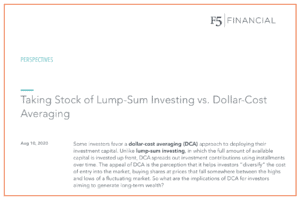Dollar Cost Averaging vs Lump Sum Investing
By: Curt Stowers
Dollar Cost Averaging – The Good
Many investors are familiar with the concept of dollar cost averaging (DCA). In fact, I would suspect that a large number of investors actively execute this strategy vis-à-vis their 401(k) plans. Basically, the idea is that at fixed periods of time, you buy in “chunks” of equity. In so doing, you average out the highs and lows and get a “good” price.
I am a HUGE fan of DCA because of the BEHAVIOR it drives in terms of systematic investing. For too many people, fear is the biggest deterrent to investing. DCA helps to avoid the decision on whether or not to invest by making it automatic. However, DCA also plays on the fear of “buying too high” by getting the “lows” that “always” occur over time—the “lows” and “always” are offered tongue in cheek
Dollar Cost Averaging – The Bad
While history is not guaranteed to repeat, when it comes to investing, I believe it is the best source of information available to see how markets have performed. News flash—which hopefully will NOT come as a shock— markets have been up over the long term. “Duh” you say.
Well, if markets have been up over time, doesn’t it follow that DELAYING purchasing vis-à-vis DCA will actually result ON AVERAGE in a higher acquisition cost? As mentioned above, DCA plays on the fear of buying in high; however, “high” today has historically been shown to be “low” tomorrow. Hence, ON AVERAGE, investors are better off investing immediately.
Lump Sum Investing
Standard disclaimer here, I’m not your advisor so don’t do anything based on what you read here/this is all just informational! In general, lump sums are going to return higher long-term if invested immediately than if invested via a DCA approach over time. HOWEVER, our propensity to “feel” loss more than gain, makes recommending lump sum investing something that many advisors are reticent to discuss. The argument goes something like this:
- If the market goes up over time and we use lump sum investing, I have a happy client. Ideal situation!
- If the market goes up over time and we use DCA, I have a happy client because things are going up. They may be a bit disappointed that they didn’t get ALL of the gains, but they got a bunch. Good situation.
- If the market goes down and we use DCA, I have a client that may not be happy, but they ARE happy that they did not put “all” of their money in right before the market downturn. OK situation
- If the market goes down and we use lump sum investing, I have an upset client because they bought at the peak. Bad situation.
So, while the averages favor lump sum investing, the 4 scenarios above show that the only “bad” outcome can come if an advisor recommends lump sum investing and the market goes down. As a result, many advisors will not advocate investing in any manner other than DCA.
While mathematically, lump sum “dominates” DCA, there is a potential behavioral aspect associated with the fourth option above that argues for DCA. In particular, some investors simply cannot handle the cognitive dissonance associated with a loss of principle immediately after they invest.
These investors are prone to “pull out” and, in so doing, experience loss of capital associated with the market downturn. For this reason, in some situations DCA will “trump” lump sum investing because of this behavioral pattern.
What To Do?
Attached is a link to a paper that goes a bit more into this topic. As we always advise, the key is to develop an investment strategy that you can stick with through all but the most unforeseen circumstances. Take the time to evaluate your approach to investing—be it DCA or lump sum—and make sure that you can maintain the strategy throughout the highly likely ups and downs of market cycles.
Would You Like More Support?
- Do you have a well-defined Investment Policy Strategy that is used to drive your investments in support of a comprehensive financial plan?
- If not, would you like to partner with someone who is used to helping people get through these struggles and (then, with confidence) implement portfolio strategies in a systematic manner while focusing on your desired outcomes?
If so, feel free to send us an email or give us a call. We’d love to have the opportunity to help you find a bit more peace of mind when it comes to investing.
Photo credit: rawpixel.com
F5 Financial
F5 Financial is a fee-only wealth management firm with a holistic approach to financial planning, personal goals, and behavioral change. Through our F5 Process, we provide insight and tailored strategies that inspire and equip our clients to enjoy a life of significance and financial freedom.
F5 Financial provides fee-only financial planning services to Naperville, Plainfield, Bolingbrook, Aurora, Oswego, Geneva, St. Charles, Wheaton, Glen Ellyn, Lisle, Chicago and the surrounding communities; to McDonough, Henry County, Fayette County, Atlanta and the surrounding communities; to Venice, Sarasota, Fort Myers, Port Charlotte, Cape Coral, Osprey, North Port, and the surrounding communities; and nationally.
We'd love to have the opportunity to hear about your situation. Contact us here to schedule an appointment for a consultation.
Learn more about What We Do.
Helping You With
Wealth Preservation – Wealth Enhancement – Wealth Transfer – Wealth Protection – Charitable Giving

